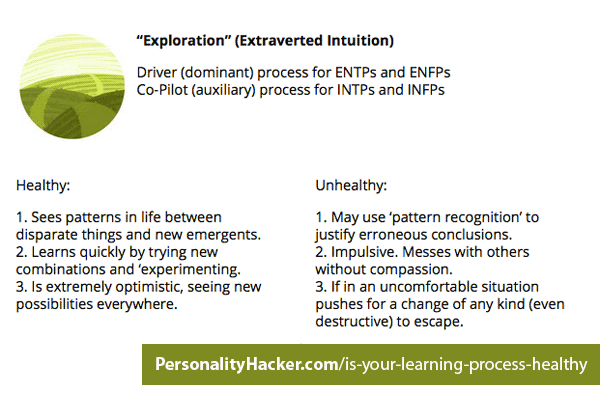The technical name for a learning mental process is your ‘perceiving’ cognitive function. For a complete list of type functions, please refer to these quick reference guides. To find a list of healthy and unhealthy expressions of the ‘judging’ cognitive functions please reference the podcast “Developed vs. Undeveloped Decisions.“
 “Perspectives” (Introverted Intuition)
“Perspectives” (Introverted Intuition)
Driver (dominant) process for INTJs and INFJs
Co-Pilot (auxiliary) process for ENTJs and ENFJs
Healthy:
1. Dives deep into the subconscious to see patterns within the human mind.
2. Is not married to own perspectives, so can usually find different perspectives, including specific ones of others.
3. Sees into the future.
Unhealthy:
1. Becomes ‘trapped’ in inner world and stream of consciousness dialog.
2. Paranoid. “Switches perspectives” to see ill intent and to justify erroneous conclusions.
3. May become fearful of the future, assuming worst case scenarios.
“Exploration” (Extraverted Intuition)
Driver (dominant) process for ENTPs and ENFPs
Co-Pilot (auxiliary) process for INTPs and INFPs
Healthy:
1. Sees patterns in life between disparate things and new emergents.
2. Learns quickly by trying new combinations and ‘experimenting.
3. Is extremely optimistic, seeing new possibilities everywhere.
Unhealthy:
1. May use ‘pattern recognition’ to justify erroneous conclusions.
2. Impulsive. Messes with others without compassion.
3. If in an uncomfortable situation pushes for a change of any kind (even destructive) to escape.
 Introverted Sensing, aka “Memory”
Introverted Sensing, aka “Memory”
Driver (dominant) process for ISTJs and ISFJs
Co-Pilot (auxiliary) process for ESTJs and ESFJs
Healthy:
1. Works like a multi-sensory autobiographer, recording and reliving personal experiences and their significance/impact.
2. Preserves precedent and order, and will create it if not present.
3. Desires/understands stability and tradition.
Unhealthy:
1. Can feel trapped by past experiences or decisions.
2. Seeks psychological comfort, retreating to ‘comfort zones’ avoiding all growth.
3. Becomes resistant to new experiences and hostile to novelty.
 Extraverted Sensing, aka “Sensation”
Extraverted Sensing, aka “Sensation”
Driver (dominant) process for ESTPs and ESFPs
Co-Pilot (auxiliary) process for ISTPs and ISFPs
Healthy:
1. Understands athletics and kinesthetics, learns through movement and activity.
2. Is fully present and in the moment.
3. Loves being in action and pushes the body and environment to their limits; naturally understands ‘body language’.
Unhealthy:
1. Becomes physically self-indulgent. Wants to feed cravings – food, sex, alcohol, drugs, exercise, etc…
2. Won’t consider future consequences or how actions impact others.
3. Can become reckless.
Here Are The Above Descriptions In Shareable Images
Want to learn more?
Discover Your Personal Genius
When you’re ready, here are five ways we can help you grow…
1. Reclaim Authorship of Your Life (Free Audio): Become the Main Character Your Own Life
2. Regulate your Body, Emotions, Thoughts, & Intuition with Self-Regulation Mastery
3. Understand yourself at a deeper level with a Personality Owners Manual
4. Master the Art of “Deep Reading” people in Profiler Training
5. Rewire your Brain & Build a Life that Fits You in the Personality Life Path






Share:
Chakra Exercises for Highly Sensitive People
Can Emotional Trauma Impact Personality Typing?
10 comments
I’m glad I could be of assistance Debra!
Yes! Employing one’s copilot would be easier than acknowledging and overcoming negative tendencies for sure. Thanks Charis!
Yes and no Debra. It is always going to help to recognize your weaknesses and endeavor to overcome them. But it would actually be harder to just will yourself to overcome your tendencies than to simply exercise your co-pilot. You lead with an extraverted process but your co-pilot is introverted. If you refuse to exercise your introverted process you will always struggle to become balanced. We all need to play in the world that is opposite the driver. In other words, if the driver is extraverted you need to go inside yourself on occasion to be a more rounded out human being – and vice versa.
The co-pilot will also be the opposite of the driver in that if the driver is a learning process, the co-pilot will be decision making. If the driver is a decision making process, the co-pilot will be the learning process. Both work best when used in tandem and the individual will suffer if they rely upon one to the neglect of the other. Either they make decisions too rashly, without considering the implications, or they freeze and avoid making decisions all-together.
Does that answer your question?
Oops, when I said decision making, I meant to say learning process!! And since it depends on what process you are leading with, decision making or learning then the copilot may well be your learning process already so developing he copilot is not as straight forward a path… Sorry to ramble here, my learning process is extraverted intuition so I am off on tangents imagining the possible approaches to this.
So the best way to stay on the healthy side with one’s decision making process would be to develop your co-pilot? Or is it simpler than that? I imagine just knowing what unhealthy aspects of your decision making can look like can help shift you out of that mindset…